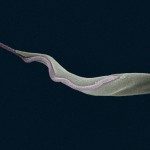Link to Pubmed [PMID] – 2528710
Parasite Immunol. 1989 Jul;11(4):385-95
The kinetics of macrophage activation were compared among inbred strains of mice (C3H, BALB, B6 and B10.A) that are known to differ in their relative resistance to infections with the myotropic strains (Colombian and CL) of Trypanosoma cruzi. The parameters utilized to measure macrophage activation were rapid spreading on glass surfaces, hydrogen peroxide release and tumour necrosis factor/cachectin production. Macrophages obtained from C3H (susceptible), BALB (intermediate) and B6 or B10.A (resistant) mice infected with both strains of T. cruzi began to spread rapidly at the onset of parasitaemia. Surprisingly, the amount of hydrogen peroxide released by peritoneal cells obtained from the more susceptible mouse strain (C3H) was significantly higher than in the other mouse strains. Also, only in the serum of C3H mice was tumour necrosis factor/cachectin detected. These results suggest that resistance against infections with myotropic strains of T. cruzi does not correlate with enhanced macrophage activation. It is also shown that the acquired macrophage activation is largely dependent on T-lymphocytes bearing the phenotypic marker CD4 (helper/inducer), since all parameters of macrophage activation were significantly inhibited in athymic mice or in C3H mice treated in vivo with monoclonal antibody anti-CD4+ T-cells.

